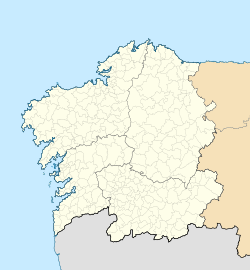
Back Vigo Afrikaans Vigo AN فيغو Arabic فيجو ARZ Vigo AST Viqo Azerbaijani بیقو AZB Віга Byelorussian Віга BE-X-OLD Виго Bulgarian
Vigo | |
|---|---|
| Nickname: The Olive City | |
 Location of Vigo | |
| Coordinates: 42°13′53″N 8°42′45″W / 42.231356°N 8.712447°W | |
| Country | Spain |
| Autonomous Community | Galicia |
| Province | Pontevedra |
| Comarca | Vigo |
| Government | |
| • Type | Ayuntamiento |
| • Body | Concello de Vigo |
| • Mayor | Abel Caballero (PSdeG-PSOE) |
| Area | |
| 109.1 km2 (42.1 sq mi) | |
| Elevation | 0 m (0 ft) |
| Population (2018)[1] | |
| 293,642 | |
| • Density | 2,700/km2 (7,000/sq mi) |
| • Metro | 545,892 |
| Demonym(s) | Vigoan vigués (m), viguesa (f) olívico (m), olívica (f) |
| GDP | |
| • Metro | €20.125 billion (2020) |
| Time zone | UTC+1 (CET) |
| • Summer (DST) | UTC+2 (CEST) |
| Postcode | 36200-36392 |
| Area code | +34 986 |
| Website | hoxe |
Vigo (Galician: [ˈbiɣʊ], locally [ˈbiħʊ]; Spanish: [ˈbiɣo] ⓘ) is a city and municipality in the province of Pontevedra, within the autonomous community of Galicia, Spain. Located in the northwest of the Iberian Peninsula, it sits on the southern shore of an inlet of the Atlantic Ocean, the Ria de Vigo, the southernmost of the Rías Baixas. It is the capital of the comarca of Vigo.
The municipality, with an area of 109.06 km2 (42.11 sq mi) and a population of 292,374 in 2022 including rural parishes, is the most populous municipality in Galicia. The area of the municipality includes the Cíes Islands, part of the Atlantic Islands of Galicia National Park.
Vigo is one of the region's primary economic agents, owing to the French Stellantis Vigo Plant and to its port.[3] Close to the Portugal–Spain border, Vigo is part of the Galicia–North Portugal Euroregion. The European Fisheries Control Agency is headquartered in Vigo.
- ^ Municipal Register of Spain 2018. National Statistics Institute.
- ^ "Gross domestic product (GDP) at current market prices by metropolitan regions". ec.europa.eu.
- ^ "Consolidation Top down and Bottom up Analysis" (PDF). p. 9. Archived (PDF) from the original on 2020-02-13. Retrieved 2020-02-13.








